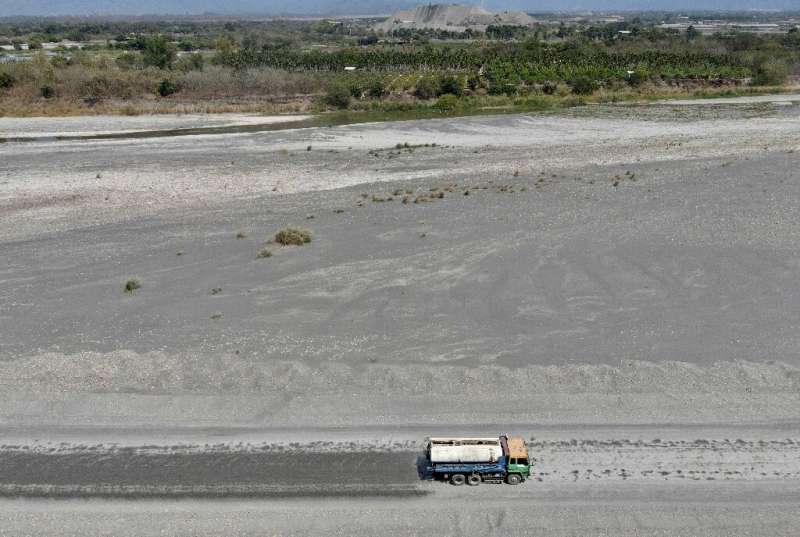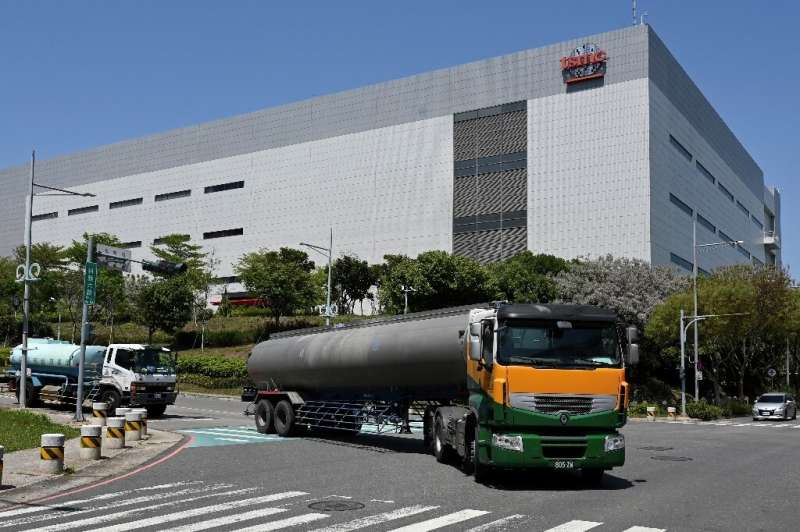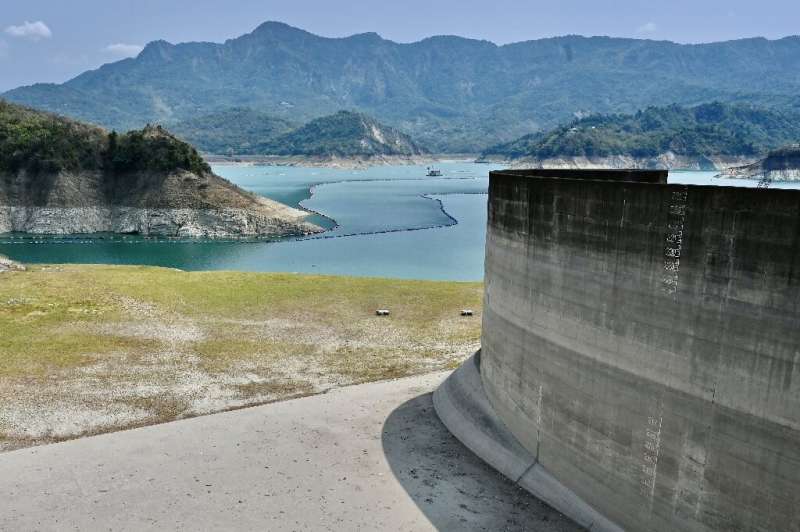Taiwan's worst drought in decades deepens chip shortage jitters

In the foothills of Taiwan's mountainous spine, reservoirs are running dry as the island experiences its worst drought in decades—a crisis that risks deepening an already acute global semiconductor shortage.
Taiwan is home to some of the world's biggest and most advanced high-tech foundries, a linchpin of a global $450 billion industry that provides the computing power for essential devices, but is extremely water-intensive.
The coronavirus pandemic sparked a global run on microchips as consumers snapped up electronics—causing a dearth that Taiwan's microchip factories were struggling to plug even before the drought hit.
Those foundries are already running at full capacity trying to meet demand.
But the sudden lack of rain is making a bad situation worse for a manufacturing process that uses billions of gallons of water a year to stave off contamination of its products.
"From notebooks, monitors, TVs, smartphones, tablets to cars, there is an overall shortage of chips. We haven't seen anything like this before," Eric Li, a spokesman for Himax Technologies, which designs chips used in screen displays, told AFP.
Taiwan is one of the world's wetter places, with an annual rainfall of 2,600 millimetres.
Typhoons regularly slam into the island from the east during the rainy season and replenish reservoirs.
But for the first time in 56 years, no typhoon made landfall in Taiwan in 2020.

And, during the first three months of this year, rainfall has been less than 40 percent of the usual rate.
In southern Taiwan, levels at the largest reservoir Tsengwen have fallen to a 15-year low at less than 12 percent capacity while the Baihe reservoir is completely dry.
Water rationing
Earlier this month the government imposed water rationing for more than one million households and businesses in central Taiwan.
Many farmers' fields are having to go without and homes have taps cut off for two days a week.
The island's three major science parks, where many leading tech companies are based, have been ordered to slash water usage by up to 15 percent.
"This has started to make semiconductor factories nervous when they have more semiconductor orders," said Iris Pang, a Taiwan economy specialist at ING, who said the current chip shortage would probably last into next year and possibly into 2023.
"This is because demand is likely to rise along with the global recovery but building new production lines can be a slow process."
Taiwan's chip foundries are already struggling to meet soaring demand for semiconductors.

In the car industry, which cancelled many chip orders early in the pandemic, the crunch has got so bad that major automakers such as Ford, Nissan and Volkswagen have scaled back production, leading to estimates of some $60 billion in lost revenue for this year.
Taiwan Semiconductor Manufacturing Company (TSMC), the world's largest contract microchip maker, has said it is operating at full capacity "with demand from every sector".
Making semiconductors is a hugely water intensive process throughout the manufacturing process, from cleaning the chips themselves, keeping state of the art foundries hyper-sterile and washing away waste chemicals.
TSMC alone used 156,000 metric tons of water a day across Taiwan's three science industrial parks in 2019—the equivalent of 60 Olympic-size swimming pools.
The company is among chipmakers who have started trucking in water to its foundries and has played down concerns that the drought will further hit production.
"TSMC has always maintained contingency plans for each stage of water restrictions... So far there's no impact on production," it said in a statement.
This month TSMC said it was planning to invest $100 billion over the next three years to build new production lines.
Concentration in Asia
Alan Patterson from industry magazine EE Times said water shortages were unlikely to seriously impact chipmakers at this point.

But there is a danger in "the potential overbooking of semiconductor orders".
"Given the urgent need to secure supplies of chips, some companies may be ordering more supplies than they actually need," he told AFP.
But a prolonged drought could start to hit manufacturing.
And some critics have urged Taiwan to dig more wells to make up for periods of rainfall shortages, especially as climate change leads to less predictable weather patterns.
The chip shortage has also focused attention on how the vast majority of semi-conductors—especially the thinnest ones vital for the latest 5G technologies—are made in just two places, Taiwan and South Korea.
TSMC has announced plans to build a new facility in Arizona as part of a push to diversify its global supply chain.
US chip rival Intel has also unveiled plans to spend $20 billion building two new plants in Arizona as part of a plan to boost production at home and in Europe.
"Having 80 percent of all supply in Asia simply isn't a palatable manner for the world to have its view of the most critical technology," Intel chief executive Pat Gelsinger told the BBC.
"And the world needs a more balanced supply chain to accomplish that."
© 2021 AFP




















